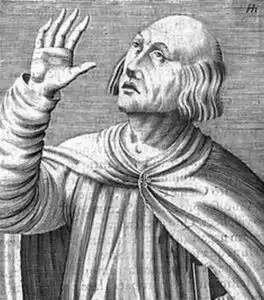
Ratramnus, a prominent Carolingian monk and theologian, lived during the 9th century. His exact dates of birth and death are not precisely known, but his theological contributions, notably in the realms of predestination and the Eucharist, marked him as a significant figure in medieval Christian thought. His works, characterized by a meticulous approach to doctrinal issues, continue to be of scholarly interest, offering insights into the theological debates of the Carolingian era.
Theological Contributions and the Eucharist Debate
Ratramnus’s theological legacy is most notably encapsulated in his treatises on predestination and the Eucharist. His work on the Eucharist, “De Corpore et Sanguine Domini,” written around 831, was in response to Paschasius Radbertus’s doctrine, which emphasized the literal presence of Christ’s body and blood in the Eucharist. Contrarily, Ratramnus argued for a more symbolic interpretation, positing that the presence of Christ in the Eucharist was not physical but spiritual. This stance placed him at the center of one of the most significant theological debates of the Carolingian era, highlighting the diversity of thought within the Carolingian church. His nuanced approach to the Eucharist question reflects a broader characteristic of Carolingian theology: a willingness to engage with complex doctrinal issues in a reasoned and scholarly manner. Ratramnus’s writings illustrate a deep engagement with the theological traditions of the church, coupled with a commitment to doctrinal clarity and precision.
Predestination and Its Impact on Carolingian Thought
In addition to his contributions to the Eucharist debate, Ratramnus also delved into the contentious issue of predestination, a topic that has perennially fascinated theologians. His treatise on predestination, “De Praedestinatione,” is indicative of his ability to navigate complex theological concepts with intellectual rigor. In this work, Ratramnus explored the balance between divine omniscience and human free will, a debate that resonates through centuries of Christian theology. Ratramnus’s perspective on predestination underscored the tension within Carolingian theology between determinism and the agency of human beings in achieving salvation. His writings on this topic contributed to a broader theological discourse, influencing subsequent generations of theologians. The legacy of Ratramnus’s thought on predestination lies in its nuanced understanding of the interplay between divine providence and human action, a theme that remains central to Christian theological discussions. His works, characterized by an analytical and systematic approach, reflect the intellectual vigor of the Carolingian Renaissance. Ratramnus’s ability to engage with complex theological debates not only demonstrates his scholarly acumen but also his significant role in shaping the contours of medieval Christian thought.
Ratramnus’s Influence on Carolingian Scholarship
Ratramnus’s impact extended beyond theological debates, significantly influencing Carolingian scholarship. His intellectual rigor and methodical approach to theological issues exemplified the scholarly spirit of the Carolingian Renaissance. Ratramnus’s writings, particularly in areas of scriptural interpretation and patristic studies, underscored a commitment to intellectual enquiry and academic rigor. His ability to integrate classical learning with Christian theology was a hallmark of Carolingian scholarly pursuits, reflecting a broader cultural movement towards the fusion of traditional and Christian knowledge.
This synthesis of classical and Christian thought, championed by figures like Ratramnus, played a crucial role in shaping the intellectual landscape of medieval Europe. The Carolingian Renaissance, with its emphasis on learning and scholarly activity, found in Ratramnus a representative figure whose works embodied the era’s intellectual aspirations.
Ratramnus’s Lasting Legacy in Christian Thought
The enduring legacy of Ratramnus in Christian thought lies in his nuanced approach to doctrinal issues and his commitment to scholarly discourse. His writings, particularly on the Eucharist and predestination, continued to be referenced and debated long after his time, influencing medieval and even modern theological discussions. The balance he struck between faith and reason, tradition and innovation, set a precedent for subsequent theological enquiries.
Ratramnus’s contributions to Christian theology are reflective of the dynamic and diverse nature of Carolingian intellectual life. His works remain a testament to the vibrancy of theological debate during this period and continue to offer valuable insights into the historical development of Christian doctrine.
Ratramnus, a Carolingian monk and theologian, played a pivotal role in shaping the theological and intellectual contours of his era. His contributions to the Eucharist debate and predestination remain significant milestones in Christian theological history. His legacy, marked by a commitment to scholarly enquiry and theological precision, continues to resonate in the realms of Christian thought and historical scholarship.
References
- Evans, G.R. The Language and Logic of the Bible: The Road to Reformation. Cambridge University Press, 1985.
- Fletcher, Richard. The Conversion of Europe: From Paganism to Christianity 371-1386 AD. University of California Press, 1997.
- Mayr-Harting, Henry. The Coming of Christianity to Anglo-Saxon England. Pennsylvania State University Press, 1991.
- Noble, Thomas F.X. The Republic of St. Peter: The Birth of the Papal State, 680-825. University of Pennsylvania Press, 1984.
